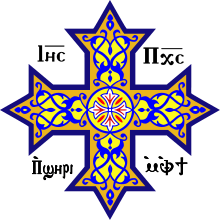Evangelical Church of Egypt (Synod of the Nile)
| Part of the series on |
| Copts |
|---|
 |
| Culture |
| Regions |
| Religions |
| Language |
| Writing Systems |
The Evangelical Church of Egypt (Synod of the Nile) (also called the Evangelical Presbyterian Church in Egypt, Arabic: الكنيسة الإنجيلية El-Kanisah El-Injiliyah) is a Protestant church that started as a mission of the United Presbyterian Church of North America among Coptic Egyptians in the late nineteenth century. The Evangelical Church of Egypt became autonomous in 1957 and officially independent in 1958. It has eight presbyteries, 314 congregations, and about 250,000 members.[1]
Emile Zaki, is a pastor and also the general secretary of the Evangelical Presbyterian Church of Egypt, also known as the Synod of the Nile. The Synod of the Nile has about 250 congregations worldwide, including a few worshiping groups without their own building. It helps with running hospitals, clinics, social service and employment agencies, retreat centers, day schools, and its own seminary. The Evangelical Presbyterian Church founded the nation's first primary school for girls.[2]
To train pastors the denomination maintains the Evangelical Presbyterian Seminary in Cairo. This is the only Protestant Seminary in the whole country.[3]
These Evangelical Christians operate in a context far different from North America. Between 94 and 95 percent of Egyptians are Muslim. Of the 4-5% who are Christian, over 90 percent are Coptic Orthodox. The 10 percent of non-Orthodox Christians include Catholics and several Protestant groups. However, a steady trickle of Orthodox Copts are joining the evangelicals because they are seen as (among other things) less laden with heavy ritual, more generous with welfare and more flexible over marriage and divorce.[4]
The church is a member of the World Communion of Reformed Churches[5] and the Egypt Council of Churches, which formed in February, 2013.[6] Partner church is the Church of Scotland.[7]
Among others, the Gustav-Adolf-Werk (GAW) as the Evangelical Church in Germany Diaspora agency actively supports persecuted Protestant Christians in Egypt with aid projects.[8]
The church currently claims to own the Anglican Diocese of Egypt.[9]
See also
References
- ↑ http://www.oikoumene.org/en/member-churches/evangelical-presbyterian-church-of-egypt-synod-of-the-nile
- ↑ http://www.oikoumene.org/en/member-churches/evangelical-presbyterian-church-of-egypt-synod-of-the-nile
- ↑ http://www.presbyterianmission.org/ministries/global/egypt/
- ↑ "Copts and marriage: You can't just marry anyone: A secular step in a conservative country", dated Jun 3rd 2010, Cairo, from The Economist print edition.
- ↑ WCRC churches AFRICA Archived August 8, 2012, at the Wayback Machine.
- ↑ http://www.anglicancommunion.org/acns/news.cfm/2013/3/18/ACNS5353
- ↑ http://www.reformiert-online.net/adressen/detail.php?id=12172&lg=eng
- ↑ Lage- und Tätigkeitsbericht des Gustav-Adolf-Werkes für das Jahr 2013/14 Diasporawerk der Evangelischen Kirche in Deutschland (GAW yearly report, in German)
- ↑ http://www.christiantoday.com/article/anglican.church.in.egypt.under.heavy.attack.by.other.christians/99107.htm